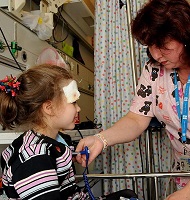
Dr. Yoram Ben Yehuda, head of Hadassah’s pediatric emergency unit, has taken the lead in protecting children throughout Israel.
During his first six months at the pediatric emergency unit of a busy Tel Aviv-area hospital, Dr. Yoram Ben Yehuda saw not one instance of child abuse. “I had just got back from a two-year fellowship at the Children’s Hospital of The King’s Daughters in Norfolk, Virginia,” he says. “There, I had seen at least one such case every shift.”
He checked with neighboring hospitals and found they, too, seldom saw child abuse. “Are we Israelis really so exemplary?” he recalls musing. “I wanted to believe it, but it made no sense. With one third of Israel’s population under 18, and abuse and neglect of children occurring at all social, economic and educational levels, and especially in stressed populations, it seemed more likely it was there, but undiagnosed.”
Today, Dr. Ben Yehuda is head of the pediatric emergency unit at the Hadassah–Hebrew University Medical Center in Jerusalem, responsible for youngsters under 18 at its newly created Bat Ami Center for Treating Sexual Abuse and proactive in child protection nationwide. However, it was in Virginia that Dr. Ben Yehuda’s eyes were forcibly opened to failure to diagnose.
“A pretty young blond woman brought in a toddler covered in livid bruises,” he says. “Suspecting a blood-clotting disorder, the ER team ran blood counts and coagulation function tests. The child was sent to his primary-care physician for further testing. Abuse was not considered. All results were negative. ‘Had the hospital team thought of abuse?’ asked the primary-care physician. The physician was a woman, working in a community practice and had a foreign accent,” says Dr. Ben Yehuda. (She was, in fact, Israeli.) “Her suggestion was discarded.”
Two weeks later, the child was in pediatric intensive care. Scans showed multiple fractures and hemorrhages, old and new–irrefutable evidence of shaking and battering. “Three weeks later, this little boy died,” says Dr. Ben Yehuda. “His tragedy indelibly taught me that damage deliberately inflicted on children by adults must always be considered in the differential diagnosis.”
Dr. Ben Yehuda returned to Israel in late 1999 on a mission far broader than his new job of founding and directing a pediatric emergency unit at the Wolfson Medical Center in Holon. As the months passed without any abuse cases reported, he began teaching colleagues–physicians, nurses and social workers–what to look for. “Your starting point,” he would always begin, “is a very high index of suspicion.”
It was only 12 years since Israel had officially accepted that child abuse existed in the country, and few in the medical establishment knew much about diagnosing it. A rare exception was Dr. Yigal Shvil, a pediatrician at Hadassah. In 1970, he had saved a 9-month-old baby from her violent father and took the offender to court in the first child abuse case ever heard in the Israeli judicial system (the father was ultimately prosecuted under a different charge). Dr. Shvil would prove a valued colleague and mentor. In 2006, Dr. Ben Yehuda moved to Hadassah to revamp and direct its pediatric emergency service and was in place to succeed Dr. Shvil as head of the medical center’s Child Protection Center when he retired shortly afterward.
